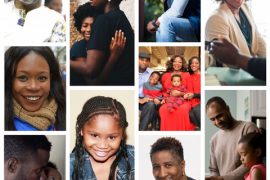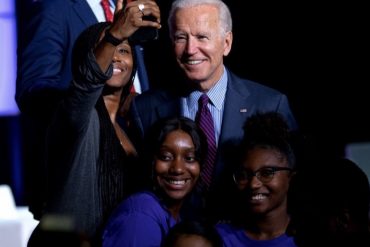Every so often a new way of thinking joins forces with a new way of communicating so that things long assumed to be true can no longer be taken for granted.
Martin Luther would have been an obscure 16th Century heretic were it not for the newfangled printing press. More recently we can fairly ask if there would have been an Arab Spring without the ubiquitous cellphone…or a Donald Trump presidency without Twitter and Fox News?
That latter nightmare ought to remind us that these recurring intersections between new technologies and potent ideas can doom us to disaster as well as draw us to discovery.
Now comes author Nina Schick with a timely warning titled Deep Fakes and the Infocalypse: What You Urgently Need to Know.
Schick zeroes in on the phenomenon of calling the truth something different. She borrows the term “Infocalypse” – defined as the dangerous and untrustworthy information ecosystem within which most humans now live – from a 2016 coinage by media theorist Aviv Ovayda.
This is the brave new world of doctored “deep fake” videos, of calculated misinformation, and of a highly partisan news ecosystem that tramples old rules that used to separate fact-based journalism from opinion-laced rhetoric.
Georgia On Our Mind
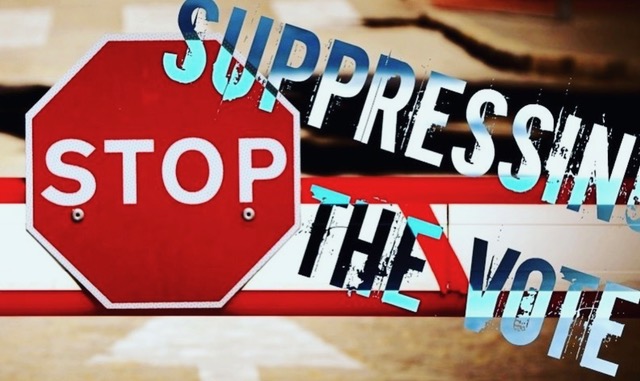
Schick’s Infocalypse is a particularly useful tool for African Americans trying to understand the huge amount of humbug swirling around today’s racially charged events. I’ve been using it of late to cut through the smoke still clouding attempts at Black voter suppression in the State of Georgia.
You may remember that, following unsubstantiated claims that Trump, not Joe Biden, won Georgia and its pivotal electoral votes, the state legislature there passed Senate Bill 202. It recently was signed into law by Governor Brian Kemp.
The New Georgia Project, founded by Stacy Abrams, promptly called it the “Voter Suppression Bill.” Her group filed suit in U.S. District Court, arguing that the new law violated both he First and Fourteenth Amendments to the U.S. Constitution.
The law enacts many new restrictions, such as eliminating Sunday voting, shortening the early voting period, limiting the number of ballot drop boxes, and prohibiting non-poll workers from giving food or water to voters waiting in line.
This Georgia drama continues to spawn subplots. Major League Baseball pulled its scheduled All-Star Game from Atlanta and is sending it to Denver. Delta Airlines, Coca-Cola, Home Depot, UPS, and other large Georgia companies have issued tepid statements against the law with language like they “support the right to vote for all.”
It’s a tightrope walk for these companies, because Black groups are threatening more, such as eliminating corporate contributions to Republicans who support suppressing the Black vote. Several Black leaders have gone so far as to advise these corporations to pull out of Georgia altogether if the law is not repealed.
Meanwhile, a backlash came from Republican lawmakers shouting that they will eliminate all tax breaks and subsidies now going to companies who publicly oppose the law. Black groups countered by threatening to boycott sponsors of the recent Masters Golf Tournament played in Augusta, Georgia.
Ironically, this year’s Masters made Lee Elder an Honorary Starter. He was the first Black golfer to play in golf’s most fabled U.S. tourney. Was the honoring of Lee Elder an attempt at balancing the scales?
So, whose “truth” is really the truth? Georgia’s governor stated there was nothing discriminatory about the new law. “It expands access” to the polls, he claimed, and follows similar “reforms” underway in Texas, Arizona, and other states.
Yet to most eyes, the Georgia law is the exact opposite of expanding access. Question: How did we come to call what we plainly see, by the name of something else?
Big, Noisy Lies

Nina Schick tackles this question straight-on. Though it was published weeks before the Georgia law blew up front pages and newscasts everywhere, the book points to the rise of Trump as Exhibit A of the all-enveloping Infocalypse.
“Nowhere is this more apparent than the elevation of a man who is perhaps the embodiment of the Infocalypse – Donald J. Trump – to the White House,” she writes.
Schick pointedly adds that “populist leaders are normalizing and perpetuating our increasingly crowded information ecosystem”, raising the question of “whether this will lead to a tipping point when Western political systems and society can no longer cope. Will robust political debate and societal progress be possible if our shared sense of reality collapses into a ceaseless domestic information war?”
Trump, Schick argues, is not just a symptom of this new, dangerous era, but is “making the crises of trust worse. Dominating the information ecosystem using his outsized influence to spread copious amounts of false information, including deep fakes and cheap fakes. He is actively feeding the partisan polarization that reduces everyone’s willingness to find common ground. It’s no accident that the United States has been gripped by societal unrest.”
Doubtless Schick would have applied these same measures to the January 6 Capitol riot more-or-less instigated by Trump, or the litany of official excuses surrounding the ongoing epidemic of Black lives lost at the hands of white police.
According to a Washington Post database, Trump made over 18,000 false and misleading claims during the three years leading up to the 2020 presidential campaign.
Schick says the truth, however, is often drowned out by “a tactic academics call censorship though noise. It is a classic tool of disinformation. By flooding the zone with so much information that no one can keep up, confusion and distraction ensue.”
Divide And Conquer
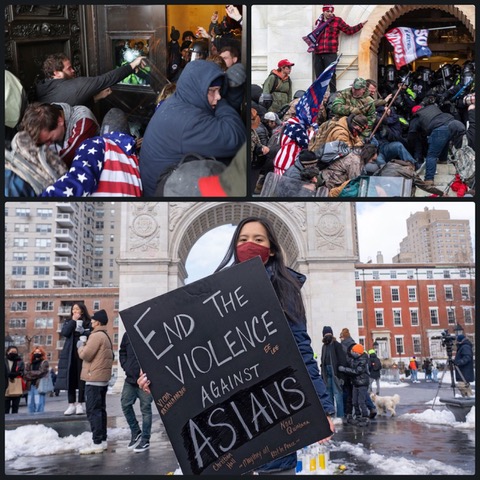
Trump has also brought America closer to the tipping point by using information warfare to entrench partisan polarization in American society. Yet while reinforcing the partisan divide suits Trump’s political objectives, it makes the United States weaker.
If Americans are too busy fighting one another, they cannot respond to existential threats that require bi-partisan solutions…like the Infocalypse.
Distrust and polarization normalized in our information systems mean it doesn’t take much for violence to spill over into real life. In the Infocalypse, Schick argues, violence can spread faster and become more and more difficult to control.
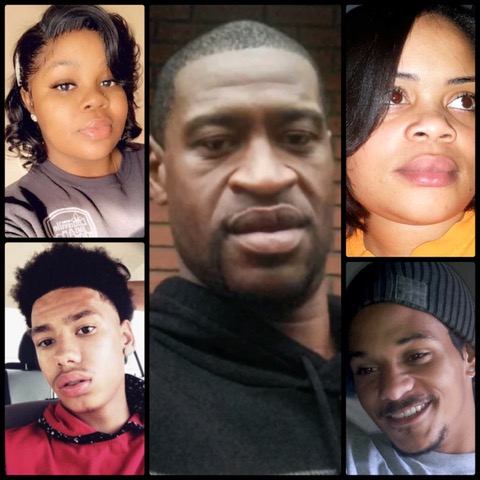
Consider that violence visited on Black people by white police. On May 25, 2020, George Floyd was murdered by a Minneapolis policeman. In April of 2021, a white policewoman kills a Black man just a few miles away, claiming she mistook her gun while reaching for a non-lethal taser.
And the list grows: Daniel Prude in Rochester, New York; Breanna Taylor of Louisville Kentucky; Atiana Jefferson in Fort Worth, Texas; Daunte Wright of Brooklyn Center, Minnesota; Marvin Scott of McKinney, Texas; Jenoah Donald in Hazel Dell, Washington; Xzavier Hill of Goochland County, Virginal; and so on.
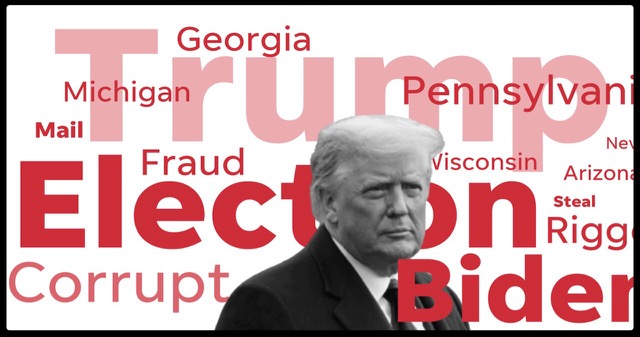
The Infocalypse will continue to evolve despite the 2020 election results, Schick posits, and that is the real challenge.
“I have told the story of the Infocalypse through one of the most dangerous actors, Trump,” she writes. “But ultimately the Infocalypse is bigger than Trump. If Trump left office tomorrow, the Infocalypse would not leave with him.
“Unfortunately, the current state of American politics makes it difficult to see how the bi-partisan effort that is needed to ward off the worst effects of the Infocalypse can be mustered. And that is the real tragedy. If a whole society mobilization against the corrupt and dangerous information ecosystem fails, we all lose.”
In the meantime, Black people continue to be under attack. Republican state legislators in several “red” states are sponsoring a blizzard of voting restrictions against Blacks, according to the Brennan Center for Justice.
Like my University of Chicago basketball coach, the late Joe Stampf, once told me: If someone hears the same lie often enough, he or she would soon believe it. “All humans,” Schick explains, “are vulnerable to what psychologists refer to as the ‘illusory truth’…the longer someone is exposed to something, the more likely he or she will believe it, even if it is fake.
“We are facing a future in which all information is untrustworthy because the environment in which it exists has become so corrupted. To avoid a permanent “fxxked up dystopia”, Schick urges that “we need to understand, defend and fight back.”
Summing It Up
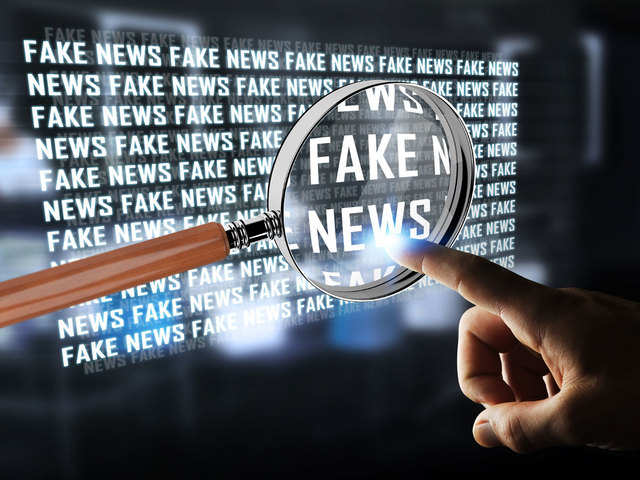
Our information ecosystem has become untrustworthy and dangerous. Our society is becoming more familiar with disinformation, misinformation, imagined conspiracies, and “fake news.”
What to do? Schick recommends several antidotes, ranging from fact-checking to self-imposed information Rules-of-Expression.
Other useful truth-finding tips are coming from Stacy Abrams, The New Georgia Project, the ACLU, Brennan Center for Justice, and the Southern Poverty Law Center.
Misinformation and polarization, a dual-threat accelerated by Trump and now perpetuated by his “base” Republicans, make it more difficult to gain a democratic consensus.
Example: a federal “For the People Act”, which tries to counter Georgia-type voter restrictions, has passed the House…but is stalled within a narrowly divided Senate.
Action Items…
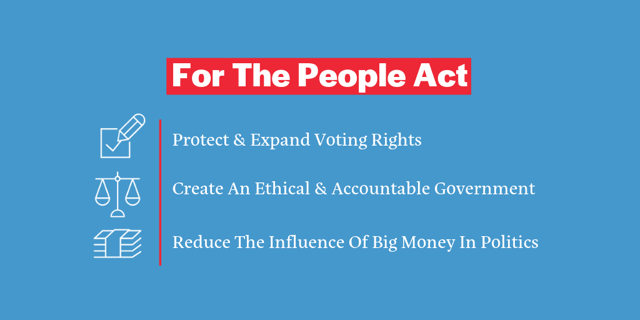

- Form a study group to discuss the “For the People Act;”
- Petition high schools and colleges to initiate curricula around polarization in the U.S.
- Support the Brennan Center, ACLU, and the Southern Poverty Law Center.
- Read Nina Schick’s Deep Fakes and the Infocalypse: What You Urgently Need To Know.
- Google Say Their Names, a work in progress which gives the names, dates and age of Blacks killed by law enforcement.
And one last thing, about the coronavirus pandemic. It is overwhelming Black life in the United States. We all know that had it not been termed a “hoax” by you-know-who, more Black people would be alive today.
Blacks are three times more likely to get infected than whites and twice as likely to die from the virus. Trusted information is an absolute necessity. We are now moving into a “fxxked-up dystopia.” Nina Schick gives us fair warning. Take it!
 (Paul King is a construction consultant and member of Chicago’s Business Leadership Council.)
(Paul King is a construction consultant and member of Chicago’s Business Leadership Council.)



